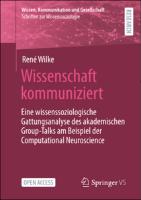Wissenschaft kommuniziert
Eine wissenssoziologische Gattungsanalyse des akademischen Group-Talks am Beispiel der Computational Neuroscience
Abstract
In diesem Open-Access-Buch steht der akademische Group-Talk als Format der wissenschaftsinternen Wissenskommunikation im Fokus. Group-Talk ist die Feldbezeichnung für das wöchentliche Arbeitstreffen einer teilnehmend beobachteten Forschungsgruppe in der Computational Neuroscience (CNS). Dass (soziale) Wirklichkeit in Interaktionsprozessen erzeugt und institutionalisiert wird, ist eine aus der Wissenssoziologie bzw. dem Sozialkonstruktivismus bereits wohlbekannte Erkenntnis. Dass diese Erzeugung maßgeblich durch kommunikatives Handeln prozessiert wird, ist spätestens seit dem Kommunikativen Konstruktivismus bekannt. Zentral in vorliegender Analyse ist daher die spezifische Form des kommunikativen Handelns, das besondere Format, in dem die CNS, als relativ junger und interdisziplinärer Forschungskontext, von den disziplinär heterogenen Wissenschaftler/-innen im Feld, kommunikativ (re-)konstruiert wird. Die wissenssoziologische Gattungsanalyse dient dabei dazu, den reinen Situationalismus zu überschreiten und die soziologische Mikroanalyse (Handeln), vor dem Hintergrund einer fokussiert-ethnographischen Feldstudie, mit gesellschaftlichen Emergenzphänomenen auf Meso- und Makroebene zu verknüpfen. Erst diese systematische Verbindung des direkt beobachtbaren Wie der Kommunikation mit dem durch ethnographisches Wissen rekonstruierten Warum, überschreitet den Horizont reiner Beschreibung und führt in die Bereiche des soziologischen Verstehens und Erklärens.
Keywords
Wissenssoziologie; Wissenskommunikation; Gattungsanalyse; Videographie; Sozialkonstruktivismus; InterdisziplinaritätDOI
10.1007/978-3-658-36704-6ISBN
9783658367046, 9783658367046Publisher
Springer NaturePublisher website
https://www.springernature.com/gp/products/booksPublication date and place
Wiesbaden, 2022Imprint
Springer Fachmedien WiesbadenSeries
Wissen, Kommunikation und Gesellschaft,Classification
Society and Social Sciences
Sociology
Media studies
Computer science


 Download
Download Web Shop
Web Shop